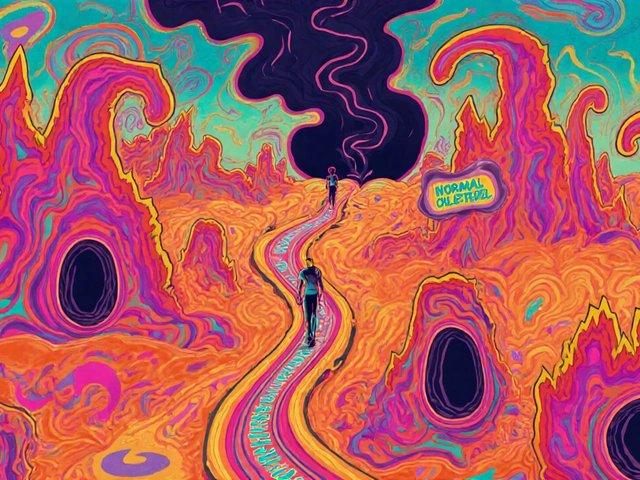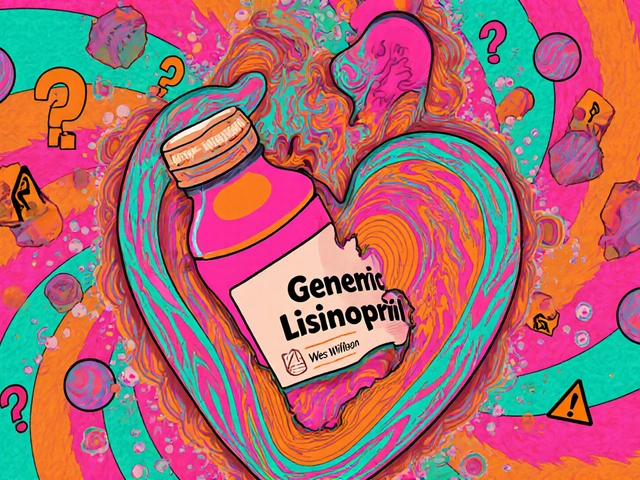
Insomnia is a sleep disorder marked by persistent difficulty falling asleep, staying asleep, or achieving restorative sleep. It touches roughly 10% of the global adult population and is a leading cause of daytime fatigue, reduced performance, and emotional instability.
Why Insomnia Matters for the Mind
When the brain is denied enough deep sleep, its ability to process emotions, consolidate memories, and regulate stress hormones collapses. A single night of poor sleep can raise the brain’s cortisol output by up to 30%, while chronic insomnia sustains that spike, turning a normal stress response into a relentless alarm.
Research from the National Sleep Foundation (2024) shows that adults with insomnia are **four times more likely** to develop clinical anxiety and twice as likely to experience major depressive episodes. The mental‑health fallout isn’t limited to mood; cognitive speed, attention span, and decision‑making-all pillars of daily well‑being-suffer measurable decline.
Key Mental‑Health Consequences
- Anxiety: Lack of sleep amplifies the amygdala’s threat detection, causing irrational worries to flare even in low‑stress situations.
- Depression: Reduced REM sleep interferes with serotonin pathways, a core driver of mood regulation.
- Cognitive Impairment: Working memory drops 20% after five consecutive nights of sleep deprivation, making errors more probable at work and home.
- Stress Sensitivity: Elevated cortisol erodes neuroplasticity, weakening resilience against future stressors.
How Insomnia Fuels a Vicious Cycle
Imagine a person who wakes up feeling exhausted, then worries about the day’s tasks. That worry spikes heart rate, making it harder to fall back asleep that night, and the cycle repeats. Over months, the brain rewires to expect anxiety at bedtime, turning insomnia from a symptom into a self‑perpetuating disorder.
Evidence‑Based Interventions
Breaking the loop requires a two‑pronged approach: behavioral adjustments and, when needed, targeted pharmacology.
| Treatment | Mechanism | Effectiveness (average reduction in sleep onset latency) | Typical Side Effects |
|---|---|---|---|
| Sleep Hygiene | Environmental and behavioral cues that promote regular sleep‑wake cycles | 10‑15 minutes | None |
| CBT‑I (Cognitive Behavioral Therapy for Insomnia) | Restructures thoughts & habits that interfere with sleep | 30‑45 minutes | Temporary increase in daytime sleepiness |
| Melatonin Supplement | Regulates circadian rhythm by mimicking the body’s natural hormone | 15‑20 minutes | Rare dizziness |
| Prescription Hypnotics (e.g., zolpidem) | GABA‑ergic activation to induce sleep | 40‑60 minutes | Dependency risk, next‑day grogginess |
Among these, CBT‑I stands out for lasting change without medication‑related risks. A 2023 meta‑analysis of 42 trials found that CBT‑I reduces insomnia severity scores by an average of 7 points (on a 21‑point scale) and also lowers anxiety scores by 3 points.

Practical Steps to Reclaim Sleep and Mental Balance
- Set a fixed wake‑up time, even on weekends. Consistency trains the internal clock.
- Limit screen exposure 1hour before bed. Blue light suppresses melatonin production.
- Adopt a pre‑sleep routine: light stretching, reading, or a warm shower.
- Reserve the bedroom for sleep only-no work laptops or stressful conversations.
- Track sleep patterns with a simple journal or a wearable; look for trends, not nightly perfection.
- If anxiety spikes at night, try a 5‑minute “worry notebook” exercise: write down concerns, then close the notebook and tell yourself you’ll address them tomorrow.
- Consider a short (<10min) guided CBT‑I module or a telehealth session after a month of self‑help.
When to Seek Professional Help
If insomnia persists beyond three months, or if you notice any of the following, schedule a consultation:
- Daytime mood swings that interfere with relationships or work.
- Persistent thoughts of hopelessness or self‑harm.
- Severe daytime sleepiness that leads to microsleeps while driving.
- Co‑existing medical conditions (e.g., chronic pain, asthma) that may require integrated treatment.
Clinicians can run standardized tools such as the Insomnia Severity Index (ISI) and the Patient Health Questionnaire‑9 (PHQ‑9) to gauge severity and guide therapy.
Linking Insomnia to Broader Well‑Being Topics
This article fits within a larger health cluster that includes Sleep Hygiene guides, Stress Management techniques, and deeper dives into Nutrition for Sleep. Readers who mastered the steps above may next explore “How Diet Influences REM Sleep” or “Mindfulness Practices for Reducing Night‑time Anxiety.”
Frequently Asked Questions
Can occasional sleepless nights cause lasting mental‑health problems?
A single night of poor sleep may cause temporary irritability or reduced focus, but lasting mental‑health issues typically arise after repeated insomnia episodes lasting weeks or months. Chronic disruption keeps stress hormones elevated, which over time can trigger anxiety or depressive disorders.
Is melatonin safe for long‑term use?
Melatonin is generally regarded as safe for short‑term use (up to 3 months). Some studies show minimal side effects even after a year, but it’s best to consult a doctor, especially if you’re on blood‑thinners or have hormonal disorders.
How quickly can CBT‑I improve sleep?
Most participants notice a reduction in sleep‑onset latency within 2-4 weeks of weekly CBT‑I sessions. Full benefits, including mood improvements, often appear after 6-8 weeks of consistent practice.
What role does diet play in insomnia?
Heavy meals, caffeine, and alcohol close to bedtime can disrupt the natural sleep cycle. Foods rich in magnesium (nuts, leafy greens) and tryptophan (turkey, dairy) support melatonin synthesis, helping the body wind down.
When should I consider prescription sleep medication?
If behavioral strategies and over‑the‑counter options fail after a 6‑week trial, and insomnia is severely affecting daily functioning, a physician may prescribe short‑acting hypnotics. They should be used at the lowest effective dose and for the shortest period to avoid dependence.





Nicholas Swiontek
September 23, 2025 AT 03:52I've been fighting insomnia for years and CBT-I was the only thing that actually stuck. 🙌 No meds, no weird side effects-just learning how to quiet my brain at night. I used to lie there for hours thinking about everything I didn't do that day... now I just breathe and let it go. It took time, but my anxiety dropped like a rock. Sleep isn't a luxury-it's oxygen for your mind.
Robert Asel
September 24, 2025 AT 13:11While your article presents a superficial overview of insomnia, it fails to address the neuroendocrine cascade in the HPA axis beyond cortisol elevation. Moreover, the assertion that CBT-I reduces anxiety scores by 3 points lacks context regarding baseline severity and control group variance. The National Sleep Foundation’s 2024 data, while cited, is not peer-reviewed in the manner required for clinical inference. Furthermore, melatonin’s efficacy is largely placebo-driven in non-circadian-disordered populations, as demonstrated by the 2022 Cochrane meta-analysis. You are oversimplifying a multifactorial disorder.
Shannon Wright
September 24, 2025 AT 23:37Thank you for putting this together-it’s so important to talk about insomnia not just as a sleep issue, but as a mental health crisis hiding in plain sight. I’ve seen clients go from panic attacks every night to sleeping through the night after just six weeks of CBT-I. The ‘worry notebook’ tip? Life-changing. One woman told me she used to cry herself to sleep thinking about her mortgage, her aging parents, her job performance... now she writes it down, folds the paper, and says, ‘Not tonight.’ And for the first time in years, she actually believes it. Sleep isn’t just rest-it’s repair. And we’ve been treating it like an afterthought. Let’s stop that.
vanessa parapar
September 26, 2025 AT 20:35Ugh, I can't believe people still think melatonin is a real solution. It's literally just a supplement you buy next to energy drinks at the gas station. If you're that tired, maybe stop scrolling TikTok at 2 a.m.? Also, CBT-I sounds fancy but it's just... being disciplined? Like, wow. Groundbreaking. I slept 8 hours last night because I turned off my phone at 10 and didn't think about my problems. Magic.
Ben Wood
September 27, 2025 AT 15:35Let me just say-this article is dangerously incomplete. You mention cortisol spikes, but you completely ignore the role of glutamate excitotoxicity in chronic sleep deprivation. And CBT-I? Sure, it works for some, but what about those of us with comorbid PTSD or bipolar disorder? You don't even mention chronotype! My chronotype is delayed sleep phase disorder-I can't fall asleep until 4 a.m., no matter what 'sleep hygiene' I follow. And you're telling me to 'set a fixed wake-up time'? That's not advice-that's a prison sentence. Also, your table is poorly formatted. Why is the last row cut off? Did you even proofread this?!
Sakthi s
September 28, 2025 AT 09:58CBT-I changed my life. No meds needed.